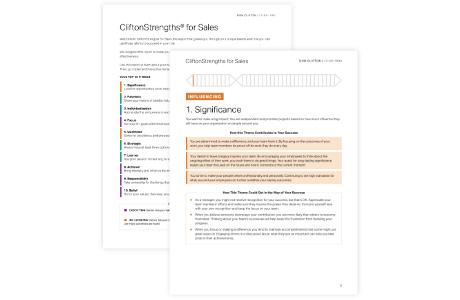Story Highlights
- Salespeople must know who they are and who they aren't
- Selling with your strengths impacts customer and sales metrics
- You know what customers need; your strengths help you deliver
There are dozens of different sales models. Each model is designed to achieve particular outcomes, like better prospecting or closing deals. But regardless of the aim, the most effective sales models help you build:
- relationships that connect you and your customer with a common purpose or goal
- solutions based on a deep knowledge of your customers' needs and how what you offer can fit those needs
- influence that helps customers see how your partnership, products and services are essential to their success
- growth based on a strong, trusting partnership that moves customers and prospects forward
"No matter what you sell, these four elements help you make sense of the space between you and your customers," says Dr. Brian Brim, Gallup practice expert, executive adviser and author of Strengths Based Selling. "Put simply, customers need to feel you connect and care about them as people, understand their needs and will guide them to the right solution for them. And they want to know you'll be there for them when they need you."
There are far more ways to build relationships, solutions, influence and growth than there are sales models. But there is only one right way -- your way.
That sounds easy. It's not. Learning how to build relationships, solutions, influence and growth your way takes skill. Developing that skill begins with understanding your CliftonStrengths.
Not Just What You Sell, But How You Sell
CliftonStrengths are what Gallup calls the patterns of thought, feeling and behavior we're all born with. Your strengths shape your expectations and how you approach your role. Everyone has strengths -- but each person uses them differently.
Customers need to feel you connect and care about them as people, understand their needs and will guide them to the right solution for them.
Sales was one of the first roles the CliftonStrengths scientists studied when they started researching what makes the best successful (and made creating the CliftonStrengths for Sales report a natural next step). We found that the best salespeople are great at convincing, negotiating and closing deals -- but approach those fundamentals differently and build relationships, solutions, influence and growth in a way that's authentic to them and their customers.
It's not just their approach that sets them apart. They get much better outcomes too. Gallup research shows that companies that develop employees' CliftonStrengths have 19% higher sales and 7% higher customer metrics. Higher profit and lower turnover as well.
"All of the great salespeople we have studied are able to take the relationship with their customers to a different level, no matter what they are selling," says Kelly Bacon, Gallup partner. "They consistently succeed because they know their own 'superpowers' with customers, hear their needs and work to make it happen based on who they are."
Gallup research shows that companies that develop employees' CliftonStrengths have 19% higher sales and 7% higher customer metrics.
Some customers, for example, respond to sales reps who strongly believe in the difference their product or service can make. That's a common trait of people motivated by the Belief strength. Salespeople driven by the Learner strength tend to do extensive research to understand their customers. Guiding through expertise and helping customers to see the world differently is typical of the Significance theme.
There are 31 other CliftonStrengths themes, and they affect each other. The key is figuring out how yours help you in your role -- then becoming skilled at using your strengths to build relationships, solutions, influence and growth.
"Think about when you were at your best and you'll see your strengths in action. Clients need you not just for what you sell, but for how you sell," says Dr. Brim. "And that depends on who you are and how you aim it."
For example, if Belief colors the way you build relationships, lean into your commitment to service and the principles you care about to inspire customers' trust (and encourage their referrals). If the Learner theme motivates your sense of influence, ask probing questions to discover prospects' and customers' worries, hopes and priorities. It gives them confidence in you and in what you sell, especially if they're dealing with a big change. If you help customers grow with the Significance theme, align your enterprising energy toward the customer's highest aspirations and biggest goals. That's where you set your sights, and your strength will elevate their aims.
"Great salespeople figure out how to leverage their strengths their own way to drive personal success," Bacon says. "We have a client with a salesperson highly motivated by the Competition strength, who had a habit of competing against customers in conversation. That never ends well. Then he recast his strengths and started partnering with customers to reach their goals. In effect, he put himself on the same team as his customer to guide their win, not compete against them for his win. He's still using his Competition, but more effectively."
The Skill You Need to Be the Salesperson Your Customers Need
All effective sales reps are good at building relationships, solutions, influence and growth -- but the best salespeople deliberately use what makes them unique, analyze their interactions with customers, and are honest with themselves about why they think and behave the way they do.
Clients need you not just for what you sell, but for how you sell.
"Many salespeople I work with have themes that push them to win and to take action, like Competition or Activator, which are all about wanting to get things moving," says Dr. Brim. "These themes motivate them to do great things, even when a customer wants to slow things down to get more information or decide if they trust you. In those critical moments, you need the skill of applying strengths the way customers need you to."
Again, it's not easy. You have to put in the work. Developing any skill takes effort. And bringing your best -- whatever that is -- to your clients is a skill. But the results are worth it.
"Deliver on client needs in whichever way you build relationships, solutions, influence and growth best," says Dr. Brim. "So, ask yourself what the client needs based on who they are and how you can deliver on that need based on who you are."
Your strengths are your greatest sales tool:
- Discover your strengths and use this sales-specific report to help you aim those strengths.
- Purchase the CliftonStrengths for Sales report.
- Subscribe to the CliftonStrengths Insights newsletter.
Gallup®, CliftonStrengths® and each of the 34 CliftonStrengths theme names are trademarks of Gallup. Copyright © 2000 Gallup, Inc. All rights reserved.





